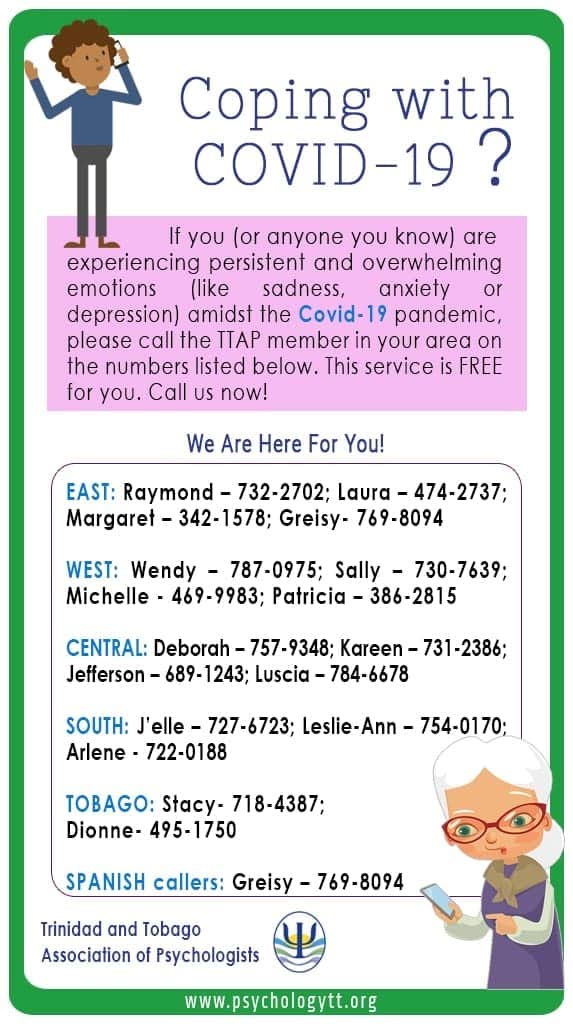Psychologists covid19 hotline floods with calls

Fear of covid19 is causing anxiety and anger in TT’s population right now, and a great deal of that fear is due to a lack of control, said psychologist Ronald John.
“The anxiety comes from the unknown. What would happen, what if? The mind will very often create the worst scenario. And if you have children, the anxiety is heightened because you want to protect them, you don’t want anything to happen to them.”
In official quarantine, he said, people had a heightened sense of anxiety. “There could be confusion in their minds between what is really happening and what they think is happening, especially if there is anticipation of test results.”
He said it was similar for those in self-isolation, those who may have come into contact with someone who was positive, or someone who returned from travelling abroad.
Dr Margaret Nakhid-Chatoor, a clinical and educational psychologist, and immediate past president of the TT Association of Psychologists (TTAP) agreed saying it was also similar for covid19 positive people in hospitals and first responders including medical staff, and even the average person at home.
“It’s a stressful situation because there is a fear, there is an anxiety about this disease that is overwhelming and that is causing strong emotions like anger and sadness.”
On March 24, TTAP launched a helpline for people with overwhelming emotions due to covid19. She said a few hours after sending out the hotline information, they received more than 75 calls.
About 12 calls were just people questioning whether it was true because they could not believe there was help for mental and psychological issues. Even some medical doctors called find out if they could share the information with their patients because they saw an urgent need for their patients.
Many people were over 65. They were fearful of catching the virus and concerned because the normal outlets for services were no longer available. For example, she said one elderly woman was concerned about how she would eat because the people who usually brought her food were confined to their homes. The rest were calls from people dealing with isolation, who lost their jobs, and who worried about paying their bills.
She said TTAP established three levels of callers. Those who were anxious, fearful, and frustrated, the psychologist would calm down. Those experiencing extreme discomfort, who experienced complicated grief and could not calm down, the psychologists promoted hope, taught them calming techniques, coping mechanisms, and how to manage their emotions.
Then there were those who were contemplating suicide. This included people with clinical issues which the situation exacerbated. In these cases, TTAP would liaise with the Victim and Witness Support Unit of the Police Service in the event of danger.
To those with mental health issues, if they could not access their usual health care providers, psychologists, or counsellors, she suggested calling the TTAP helpline and find ways to reduce their stress and take care of themselves.
These included routine exercise, eating healthy, sleeping properly, limiting the use of recreational drugs and alcohol, connecting with others using technology and social media but also knowing when to unplug. She said although people should not be on the roads or public spaces, they could still walk around the house or go in their gardens.
The advice, she said, extended to everyone.
“There are people with survivor’s guilt who felt more should have been done to prevent death, sadness leading to depression, anger and rage towards those who leave isolation, especially toward those who travelled and came back with it. The thought is if they leave the quarantine even if they are given the okay, they might increase the curve.”
John said all those feelings could become more intense for people with mental health issues. He said they had to be much more aware of their triggers and feelings, realise when they are getting anxious and take their medication before things get overwhelming.

He too suggested taking care of physical health as well as activities such as breathing exercises, and other tools to help control emotions. He added that keeping the mind active was important because it allowed people to think about something other than worrying.
He said social people may find self-isolation challenging. He said it could be a welcome change for some but even introverts’ anxiety levels may be higher because choosing to remain home and it being mandatory made a difference.
He said people needed to do things to stimulate themselves. Activities could include simple things like rearranging the furniture or cleaning the home. “That may seem very trivial but it’s extremely therapeutic. If you give your home a new look, it’s like changing your environment. It’s a new start and you’re stimulated differently.”
He added that it could be a family project and it did not have to be done all at one time.
Dealing with children
Nakhid-Chatoor said telling parents stay at home with their children, to do things with them, and get them into a routine was easier said than done.
She said some homes already had conflict – children who did not get along with parents and couples with relationship issues were now confined to one space. Also, she said young children with a lot of energy no longer had the outlet of going to the park, mall, school or beach. The situation could be frustrating to all parties and could invite depression, stress, and excessive worry.
“I could see younger children returning to behaviours that they outgrew like bed-wetting, thumb-sucking, having nightmares, crying, irritation. Which is why we have to have outlets for parents to talk about these issues and how they could cope.”
She said children often imitate adults so parents needed to be calm and confident about dealing with covid19 so they could reassure their children and teenagers that they were safe and that it was okay to feel upset.
John noted that children would want to play but the parent would have to get them to do work. And the situation could be exacerbated if the parent also had to work from home.
He said children already had structured days at school so if one lived in a structured home it would be easier for the child to adjust to school at home. If not, the children could be miserable and the parent could become agitated.

“For you, the one who is working from home, that could get you agitated and sometimes you take it out on the kids or you take it out on your partner. So many things could trigger anger and part of it is that, at the end of the day, we don’t feel in control of what’s going on around you.”
He said it was best to structure the day so working from home would be easier to manage. For example, work from 9 am to noon, have lunch and a rest, and continue working from 2 pm to 5 pm.
However people wanted to plan their day, he said, structure would made it easier to manage. Otherwise people would get bored, not knowing to do with “all this time on their hands” or have time to worry.
“They’re still isolated and have addition worries: would this thing be brought to their homes, if they would go back to work, there are people with financial issues around being at home, etc. Those things could create a lot of anxiety.”


Comments
"Psychologists covid19 hotline floods with calls"